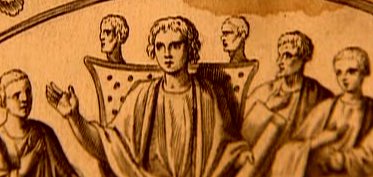It might be understood as a sequel to the meme post yesterday, but actually I planned this topic long before, and I felt Christmas suites best for it.
The evolution of Christianity is a typical example of the evolution of a non-biological fauceir. Christianity is one of the most successful religions in the world. Its followers not only outnumber all the other religions, but also Christian societies are leading in social and technological progress. So we may say that Christianity is dominating this world. It was not always that way. In ancient Rome, Christians were rather a fringe group of no importance at all. If we want to understand what changed this religion to become the most successful in the World, we have to step down the staircase to the catacombs of Rome where the earliest Christian relics can be found.
The catacombs of Rome are ancient burial places. In a time when Rome was overcrowded burial places were rare and expensive. The ancient Christians were no affluent people rather craftsmen who soon discovered while working in quarries that the rock underneath Rome composed of tuff is a fantastic material to excavate long cellars, so they finally found a place to escape the troublesome world and to hide dead loved ones in peace.
Of course, as other religions often do, Christians started decorating the tombs, and these paintings now are the only clues to ancient Christian believes still preserved today.
If at Christmas Eve people flock in churches to listen that Jesus was born to suffer for our sins, we may guess it was not always the story of a Jesus leading an life full of privations that fascinated Christian believers. At least pictures of a crucified Jesus so common in medieval churches are absent in these catacombs. Jesus is rather depicted as a scholar, a wise man who is instructing his followers.
These people seemed to strongly believe in miracles as it is depicted by the Jonas story.
Jonas fell overboard, became devoured by a dragon who disgorged him, and finally he lived in heaven. (Please remember reading this picture from the right to the left.)
What made the ancient Christians change their attitude and to celebrate a suffering Jesus instead of all this miracle stuff? The answer is an evolutionary process that closely resembles some kinds of evolution by natural selection so obvious in biology.
Ancient Rome was virtually a dictatorship and people suffered from cruelties and injustice. Concerning religion Rome was rather pluralistic many religions coexisted. Among others also Jews lived there, but only Christianity made it to the top becoming the domination religion of the Roman empire after several centuries of suffering.
As we know today, the most effective way to resist a dictatorship is to ignore hardship and intimidation. Certainly, this is not good for the one who has to suffer, it is definitely advantageous for the whole social group. So the group of Christians in ancient Rome became so resistant to Cesar’s dictatorship by encouraging members to self-sacrifice. (For a vivid illustration please read Quo Vadis) They taught Jesus’ life history as a model of an successful life though in fact he was a looser. He was a looser in respect to his own life and his family, but he made some valuable social contribution, and therefore Christian clerics maintain his life was useful.
If a compound of fauceirs succeeds in controlling its members so strongly that these members neglect individual interests and pursue the compound’s interests only, the compound, a fauceir himself, is more successful. A biological example is the worker bee in a bee hive or cells in a tissue that get specialized. As an other social example take soldiers in an army. If you appreciate this argument you will easily understand why Cromwell’s army was so successful.
Amazingly, the same ideology that made Christianity so successful to resist Roman dictatorship helped people in medieval times to resist oppression exerted by the Christian church itself, and ironically it often is the basis of atheism, at least in those people who are able to discriminate between ethics and faith. In the Christmas church the priest will remember were our ethics derived from, even those of most atheist.
Merry Christmas!

This work by Paul Netman is licensed under a Creative Commons Attribution-Share Alike 3.0 United States License.
Fauceir theory is developed and © by Mato Nagel and available at www.fauceir.org.



